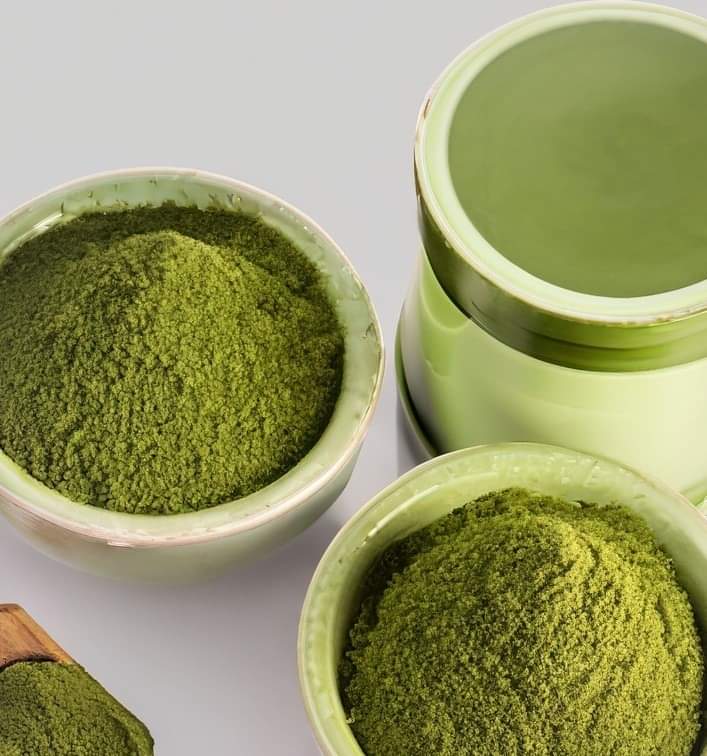Benefits
Provides Antioxidants and Anti-Inflammatory Compounds

Studies have shown that these compounds are protective of the heart, natural circulatory stimulants, and possess anti-tumor, anti-epileptic, anti-ulcer, anti-spasmodic, anti-hypertensive and anti-diabetic effects.
Moringa powder is high in several powerful anti-aging compounds that lower the effects of free radicals, oxidative stress and inflammation. These are associated with a reduced risk for chronic diseases, such as stomach, lung or colon cancer; diabetes; hypertension; and age-related eye disorders.
Balances Hormones and Slows the Effects of Aging
Levels of antioxidant status, including serum retinol, serum ascorbic acid, glutathione peroxidase, superoxide dismutase and malondialdehyde, were analyzed before and after supplementation, along with fasting blood glucose and hemoglobin levels.
Results showed that supplementing with moringa and amaranth caused significant increases in antioxidant status along with significant decreases in markers of oxidative stress. Better fasting blood glucose control and positive increases in hemoglobin were also found.
Can moringa help you sexually? There’s some evidence it may boost libido and work like a natural birth control compound, according to some animal studies.
Although it’s historically been used as a natural aphrodisiac, it actually seems to help reduce rates of conception. That said, it can boost the immune system during pregnancy and also increase breast milk production/lactation, according to some studies.
Helps Improve Digestive Health
Due to its anti-inflammatory properties, moringa has been used in ancient systems of medicine, such as Ayurveda, to prevent or treat stomach ulcers, liver disease, kidney damage, fungal or yeast infections (such as candida), digestive complaints, and infections.
A common use of moringa oil is helping to boost liver function, therefore detoxifying the body of harmful substances, such as heavy metal toxins. It might also be capable of helping fight kidney stones, urinary tract infections, constipation, fluid retention/edema and diarrhea.
Balances Blood Sugar Levels, Helping Fight Diabetes

Moringa contains a type of acid called chlorogenic acid, which has been shown to help control blood sugar levels and allow cells to take up or release glucose (sugar) as needed. This gives it natural anti-diabetic and hormone-balancing properties.
Aside from chloregnic acid, compounds called isothiocyanates that are present in moringa leaf have also been tied to natural protection against diabetes.
Can moringa help you lose weight? Because it can improve insulin sensitivity and hormone balance, it may offer some advantages to those following a weight loss plan.
Protects and Nourishes the Skin
Moringa contains natural antibacterial, antifungal and antiviral compounds that protect the skin from various forms of infections. Some of the common ways it is used on the skin include reducing athlete’s foot, eliminating odors, reducing inflammation associated with acne breakouts, treating pockets of infection or abscesses, getting rid of dandruff, fighting gum disease (gingivitis), and helping heal bites, burns, viral warts and wounds.
Helps Stabilize Your Mood and Protects Brain Health
A high-protein food, moringa is also rich in antioxidants and compounds that may improve thyroid health, which makes it beneficial for maintaining high energy levels plus fighting fatigue, depression, low libido, moods swings and insomnia.
Good for the Environment (Water and Topsoil)
A noteworthy characteristic of the moringa plant is that it’s capable of growing in depleted or dry soils where many other types of beneficial plants or trees cannot survive. This is precisely why certain undernourished populations, such as Somalia or India, have benefited from it during times of famine.
Aside from providing important nutrients, it is used to help restore fertile soil, aid in forest restoration efforts and filter water.
One interesting use of the seeds is for water purification. Combining moringa with water helps impurities cling to the seeds so they can be removed, leaving behind better quality water that’s lower in toxins.

